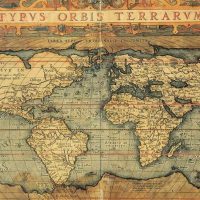Category: History Essay Examples
See our collection of history essay examples. These example essays are to help you understanding how to write a history essay. History is a fascinating puzzle with both personal and cultural significance. The past informs our lives, ideas, and expectations. Historians study the past to figure out what happened and how specific events and cultural developments affected individuals and societies. Also, see our list of history essay topics to find the one that interests you.
The Paleolithic age in the Pleistocene epoch of prehistory begins with the first use of manufactured tools by hominids and ends with the thaw of the last ice age (leading into the Mesolithic and the Neolithic age with the advent of agriculture). Its exact duration varies from place …
Palmyra (City of Palms), an oasis in the northeastern desert in present-day Syria, became a trading center and stopping point on the Silk Road as early as the 19th century b.c.e. Its importance as a trading point rose as the Seleucid Empire declined and the Palmyrenes became middlemen …
The Panathenaic Festival (Panathenaia) was Athens’s most important religious celebration and the second oldest one in the region. During the festival inhabitants of Attica (Panathenaic means “all-Athenian”) and other parts of the empire honored the goddess Athena Polias’s birthday (who had leaped from the head of Zeus, according …
The Parthenon was built in Athens, Greece, during the fifth century b.c.e. to honor the city’s patron deity, Athena. Following the Persian War, which ended in 487 b.c.e., Athens was at the height of its power. Under the leadership of Pericles, the Athenians used war monies to begin …
Pataliputra (now Patna) is located at the confluence of the Ganges and Son Rivers in northeastern India. It was the capital city of the Mauryan Empire c. 326–184 b.c.e., when it was perhaps the largest city in the world, and again of the Gupta Empire, 320–550 c.e. Alexander …
Abraham begins the discussion of the Patriarchs and, indeed, of the three modern world religions. The record of his life is found in the Jewish scriptures and is largely reaffirmed in the New Testament of the Christians and assumed by the Qur’an. After Abraham the interpretation of the …
The society of the Roman Republic and Roman Empire was made up of several levels. At the top were the patrician classes of senator and equestrian. The commoner classes of plebeians, freed peoples, and slaves had fewer opportunities in life. However, these social and political classes maintained order …
The folklore surrounding St. Patrick is bigger than life, out of proportion to the modest historical information we have. But it is not so outlandish in comparison to the impact he had on Ireland. Patrick began his mission precisely at the time that Celtic spirituality was coming out …
Paul has had an immense influence on Christianity in particular and Western civilization in general. Among those who were influenced by Paul are Augustine of Hippo, Thomas Aquinas, Martin Luther, and John Wesley. Paul’s letters, written between 51 and 59 c.e., are the most important sources of information …
Pax Romana, two Latin words meaning “Roman peace,” refers to the historical period between 27 b.c.e. and 180 c.e. Unlike former times, it was a long period of relative peace, although Rome still fought a number of wars against neighboring states and tribes. The arts and architecture flourished, …
Peisistratus (Pisistratus) was tyrant of Athens and led the drive for the unification of Attica, which enabled the city-state to achieve an eminent position in Greek history. Peisistratus was related to the reformer Solon, whose previous administrative improvements involved ending the monopoly of power exercised by the aristocracy …
The Peloponnesian War was a Greek conflict fought by the Peloponnesian League, led by Sparta, and the Athenian Empire. The war lasted 27 years, from 431 to 404 b.c.e., with a six-year truce in the middle, and ended with an Athenian surrender. The war involved much of the …
Pericles was the most important statesman and politician of classical Athens. He was a son of Xanthippus, a Persian War–era general and politician, and Agariste of the prominent but allegedly cursed Alcmaeonids. The rationalist philosopher, Anaxagoras, intellectually influenced him. He was a friend of the sculptor, Phidias, to …
Church tradition speaks of 10 great persecutions, probably in imitation of the 10 plagues of Moses. Persecutions struck a nerve among Christians, and they produced martyrologies and legends. In reality there were diverse and localized persecutions but three widespread persecutions under Decius (249–250 c.e.), Valentianus (257–258 c.e.), and …
Persepolis, literally “the City of the Persians,” was founded by Darius I the Great, the third king of the Achaemenid, or Persian, Empire (539–331 b.c.e.). Work on the city began around 518 b.c.e. but was not completed until about 100 years later by King Artaxerxes I. It was …
The Persian Wars, or Greco-Persian Wars, were a succession of conflicts between shifting alliances of Greek states and the Persian Empire. Wars were fought for the control of strategically important territories, also determining whether Greek or Persian culture predominated in the Aegean Sea. As a result of victories …
Iranian myths do not belong to just one era but many epochs over the 12,000-year chronology. The history of myth in Iran is divided into four eras, each covering three millennia. The first quarter refers to creation as a spiritual essence in which no place or time could …
Petronius was a courtier under Nero and the most likely author of the Roman novel Satyricon. If he was the man identified by Tacitus as the “arbiter of elegance” who “idled into fame” by refining debauchery into a science, his full name would be Caius Petronius Arbiter, although …
Although in ancient Egypt the term pharaoh (great house) referred to the royal palace and was used in reference to the monarch only as an instance of metonymy, modern historians follow the biblical convention of using the term for the monarch himself. Some Egyptians of the New Kingdom …
The common interpretation of the Pharisees comes to modern audiences through the speeches of Jesus (Christ) of Nazareth in the New Testament. There they play the role of Jesus’s opponents and are almost seen in a negative light. Their arguments with Jesus revolve around issues of religious customs, …


